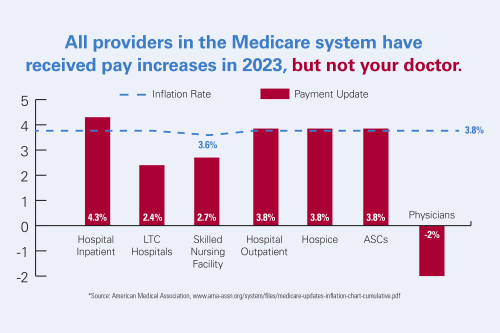Nov. 8, 2023

Looming Payment Cut Threatens Medicare Patients’ Access to Physicians’ Care – Again
Fort Worth radiation oncologist Jerry Barker Jr., MD, worries the physician Medicare pay cut set for January could have dire consequences for his patients, some of whom already struggle to get the care they need.
Though he practices in one of the larger cities in the country, he already sends some of his patients at least 30 minutes away to Dallas for medical care because he cannot find someone closer to treat them. He fears that situation will worsen.
Medicare physician pay cuts are forcing some physicians out of the program.
“I see [challenges when referring patients] for neuro-ophthalmology, endocrinology, oculoplastic surgery, and some advanced imaging, either because key physicians have left practices altogether or because wait times [for Medicare patients] to see available physicians are excessive,” said Dr. Barker. “Generally, patients are able to get care in Dallas, but with significant additional costs, delays, and inconvenience.
“This is not sustainable,” he said.
Another North Texas physician, a cardiologist, fears the new cut will force him to stop seeing Medicare patients like some other physicians have been forced to do. “I do not want to turn away Medicare patients, as their need is great and their alternatives are poor,” he said.
Patients’ options already are limited, according to Houston ophthalmologist Kathleen Archer, MD. She experienced firsthand how tough it is for many Medicare patients to find a physician who can care for them. She recalled, “When my personal physician retired… it took a year to locate another physician able to accept me as a new Medicare patient.”
The 3.37% cut in Medicare physician pay is scheduled to hit on Jan. 1, 2024. [Editor's note: The cut took effect.] That’s on top of the 2% cut that took effect earlier this year and other compounding cuts over the years. In total, inflation-adjusted physician Medicare pay has fallen 26% since 2001. Meanwhile, the consumer price index for physician services in U.S. cities increased by 65% over the same period. In contrast, payments to hospitals and other Medicare providers have matched inflation.

The cuts, inflation, and other factors are forcing some physicians into difficult decisions.
Medicare, the government health care coverage for Americans over age 65 and people with disabilities, insures nearly one in five Americans. They are most susceptible to chronic illnesses and infectious diseases. Physicians worry they will be hardest hit by the payment cuts.
“It’s a problem that’s been ongoing for over 20 years, without a permanent solution,” said Rick W. Snyder II, MD, president of the Texas Medical Association (TMA). “Congress has not passed a suitable, stable fix to safeguard access to high-quality care for the nation’s older adults and those with disabilities.”
The current answer for the physician Medicare payments crisis lies in Congress’ hands. Several lawmakers have introduced the Strengthening Medicare for Patients and Providers Act (House Resolution 2474), a bipartisan bill that would reform the Medicare system and help ensure physicians’ pay paces inflation.
“This legislation won’t solve all the problems with the physician payment system, but it is a first step to bridge the gap between what it truly costs to provide care and the payments Medicare administers,” said Dr. Snyder, whose practice sees mostly Medicare patients.
TMA is urging support of the bill.
The fix is essential, doctors say, as some physicians are resorting to drastic measures to keep their practices running so they can continue to care for Medicare patients.
Dr. Archer, who has cared for patients’ vision for nearly 40 years, said the financial health of her practice is so acute she cannot afford any staff help in her office. “I am answering my own phone and dealing with all the paperwork, along with caring for my patients,” she said. “It is frustrating.”
“Dr. Burgess, we are dying,” said Denton obstetrician/gynecologist Laura Finger, MD, in a letter to her congressman, U.S. Rep. Michael Burgess, MD, (R-Texas). “I can’t even keep a full staff. All the doctors I have referred patients to are leaving or gone. It is a tragedy.”
For doctors like these it’s not about making money, it’s about making ends meet.
“I was forced to stop taking new Medicare patients in my private practice after only a few years because the [Medicare payment] for visits was less than half of my overhead for seeing each patient,” said Michele Reynolds, MD, of Dallas. Financial stress ultimately forced the family physician to close her practice entirely. She now works as a medical researcher.
Most of all, doctors worry about the effects on their patients.
“Every Medicare pay reduction translates into [fewer] patients receiving quality care,” said Omar Garcia, MD, a physical medicine and rehabilitation specialist in San Antonio.
“Ongoing cuts to physician reimbursement not only hurts us – the physicians trying to provide the best quality care to our patients – but it ultimately hurts the patients and their loved ones suffering from life-altering conditions.”
“Many of our patients have Medicare, and we take the time needed for each person, so we won't see more than 12-13 patients a day,” said Jana Winberg, MD, a 21-year family physician in the small southeast Texas town of Kountze. “Any cuts in payment and I either have to see more each day or begin to cut back on seeing Medicare patients. Neither are good options.”
“Unless lawmakers take steps to stabilize physician reimbursement, private practices like ours will be a historical footnote,” said Dr. Barker.
TMA is the largest state medical society in the nation, representing more than 57,000 physician and medical student members. It
is located in Austin and has 110 component county medical societies around the
state. TMA’s key objective since 1853 is to improve the health of all Texans.
– 30 –
Contact: Brent
Annear (512) 370-1381;
cell: (512) 656-7320; email: brent.annear@texmed.org
Swathi Narayanan (512) 370-1382; cell: (408)
987-1318; email: swathi.narayanan@texmed.org